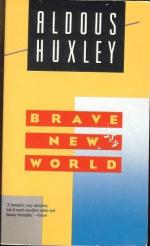|
This section contains 1,147 words (approx. 4 pages at 300 words per page) |

|
Brave New World and "Blade Runner": Man vs. Nature
Summary: Ridley Scott's film "Blade Runner" and Aldous Huxley's novel Brave New World warn of the detrimental human desire to control the natural world and its rhythms through unbridled scientific development. Both stories portray a wedge that divorces humans from their relationship with nature in order to define what it means to be "human." And both depict chilling dystopic futures in which materialistic, scientific, and economic ways of thinking have been allowed to quash humanistic, religious, and philosophical ways of thinking in the name of progress.
Ridley Scott's film "Blade Runner: Director's Cut" and Aldous Huxley's novel "Brave New World" explore the concept of `In The Wild' by focusing on the natural world and its rhythms falling victim to unbridled scientific development. They present a wedge that is divorcing man from his relationship with nature, in an attempt to define what it means to be `human'. Both texts depict chilling dystopic futures where the materialistic scientific and economic ways of thinking have been allowed to quash the humanistic religious and philosophic ways of thinking, in the name of progress. In their texts, these composers question this progress that they were already witnessing in their own individual contexts, and thus warn future contexts about straying from humanity's natural origins.
Both composers criticize their individual contexts which, though fifty years apart, deal with similar concerns for humanity and the natural environment. Huxley's context was the aftermath...
|
This section contains 1,147 words (approx. 4 pages at 300 words per page) |

|


